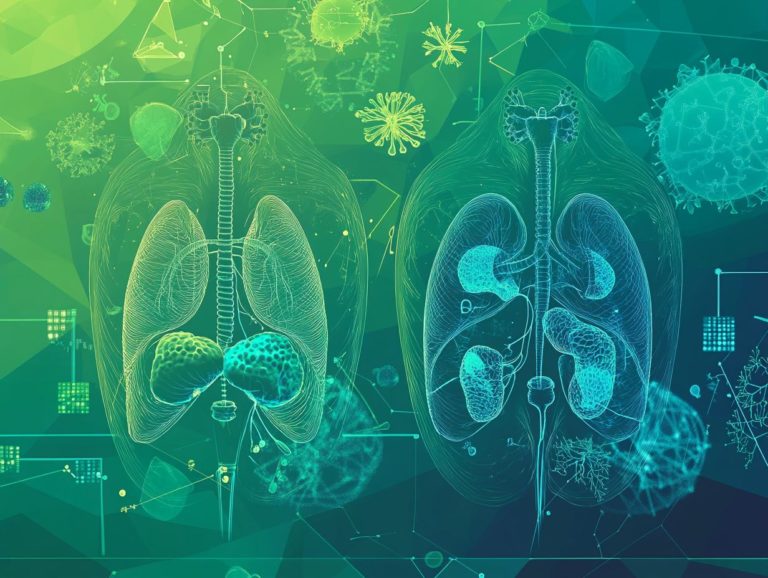The Impact of Stress on Detoxification
Stress is an inevitable companion in the hustle and bustle of modern life, and its impact can manifest in surprisingly subtle ways, especially regarding detoxification.
This article delves into the intricate relationship between stress and your body s innate ability to cleanse itself. You ll discover how stress can impede detox processes, explore effective natural methods for managing both stress and detoxification, and recognize the vital role of self-care.
Whether you re grappling with feelings of overwhelm or simply seeking to enhance your well-being, this guide offers you practical tips to handle stress and improve detoxification!
Contents
Key Takeaways:

- Chronic stress can negatively impact the body’s natural detox processes, leading to a buildup of toxins.
- Incorporating natural methods, like exercise and mindfulness, helps manage stress and supports detoxification.
- Professional help, such as therapy, can be beneficial for stress management and healthy detoxification.
The Relationship Between Stress and Detoxification
The intricate relationship between stress and detoxification is crucial for understanding how your body handles cellular toxins while maintaining vital health outcomes. As your stress levels increase, your body s stress response kicks in, which can hinder detoxification processes essential for defending against aging.
Activating Nrf2 is important because it helps your body fight stress and toxins. This pivotal protein helps control the activity of genes that orchestrate the antioxidant response, contributing to redox homeostasis, and aids in detoxification. By engaging Nrf2, you enable your body to effectively counteract the detrimental effects of stress and toxic exposure.
Effects of Stress on the Body
Stress deeply affects multiple systems within the body, initiating a cascade of physiological responses that can lead to inflammation and undermine immune function. When the stress response is activated, it can disrupt cardiovascular health by influencing flow-mediated dilation and intensifying aging defense mechanisms.
Understanding stress management is essential for your well-being while also considering the role of nutritional evaluation.
How Stress Affects Detoxification Processes
Stress can significantly impede your detoxification processes, leading to a buildup of cellular toxins that negatively impact your overall health and wellness. When your body is under stress, it struggles to carry out detoxification efficiently, which can intensify psychological dependence on unhealthy dietary habits and cloud your nutritional judgment, impacting your gut permeability.
The physiological effects of stress become apparent through the release of hormones like cortisol, which can disrupt liver function and compromise essential detoxification pathways. This disruption not only hampers your liver’s ability to process toxins but also affects your gut health, as an overwhelmed system may find it challenging to maintain a balanced microbiome. Additionally, understanding the impact of environment on sauna safety can further enhance your wellness practices.
As a result, you might encounter digestive issues that complicate your ability to manage stress effectively. You must implement dietary support now to boost your liver health! Incorporating whole foods rich in antioxidants and dairy ingredients becomes crucial. Additionally, considering nutritional supplementation can further enhance this support, helping to alleviate the negative effects of stress-induced toxin accumulation and nurture your overall well-being.
Detoxification Methods for Managing Stress

Employing effective detoxification methods, including detox strategies, is essential for you to manage stress and enhance your overall health. Embracing natural and holistic approaches, such as incorporating probiotics and prebiotics into your diet, can greatly elevate your detox process.
This promotes a balanced microbiome, which plays a crucial role in fostering emotional stability and reducing inflammation.
Natural and Holistic Approaches
Natural and holistic approaches to detoxification can be pivotal in managing stress and enhancing both your mental health and physical well-being.
Techniques such as mindfulness practices and breathing techniques foster emotional stability and cultivate a sense of community connection. This support reduces inflammation and enhances your overall health.
These methods do more than just cleanse the body; they highlight the importance of lifestyle choices that can greatly impact stress reduction, inflammation, and gut health. For example, embracing a balanced diet rich in whole foods nourishes your gut microbiome. Practices like yoga and meditation help you develop a deeper awareness of your thoughts and emotions.
A supportive community offers the motivation and accountability you need. It transforms the detox journey into a shared and enriching experience, enhancing your social engagement. Together, these holistic strategies provide a comprehensive approach, enabling you to embrace a more vibrant and balanced life.
The Importance of Self-Care in Detoxification
Self-care is your secret weapon in detoxification, as it directly impacts your dietary choices and helps mitigate stress responses.
Invest in your well-being now to supercharge your body’s detox process! Prioritizing self-care practices significantly enhances your detox journey, leading to reduced inflammation and improved overall health outcomes.
Investing time in your well-being not only supports your body s detox processes but also fosters a deeper connection to your health, enhancing your psychological resilience.
Ways to Reduce Stress and Support Detoxification
To effectively reduce stress and support detoxification, focus on incorporating essential nutrients and adjusting your dietary habits, including dietary fiber.
Understanding how to manage food cravings and optimize your metabolism can significantly enhance the detox process, resulting in improved health outcomes.
Incorporating a variety of whole foods such as leafy greens, lean proteins, and healthy fats helps create a balanced diet that stabilizes blood sugar levels, supports mental clarity, and promotes gut health.
Engaging in stress management techniques like mindfulness meditation, regular exercise, and deep-breathing exercises can greatly lower your cortisol levels. This is the primary stress hormone, and it also enhances your emotional stability.
Consider nutritional supplementation, particularly with magnesium and omega-3 fatty acids. These may provide calming effects to your nervous system and aid in glutathione production.
By fostering a lifestyle that prioritizes nutrient-dense meals and holistic practices, including purification programs, you can cultivate a harmonious balance. This balance not only alleviates stress but also promotes your overall well-being.
Seeking Professional Help for Stress and Detoxification

Seeking professional help for stress and detoxification is an essential step in your journey toward holistic well-being. It enables you to confront and overcome the challenges associated with psychological dependence on unhealthy behaviors.
Engaging in therapy and counseling provides valuable tools to navigate the detox process. Highlighting the significance of community connection and support along the way is crucial for successful behavioral response.
Join a local group today and take the first step towards a healthier you!
When to Consider Therapy or Counseling
Knowing when to seek therapy or counseling is vital for managing stress and detoxing your body. If you find yourself relying on unhealthy coping methods, like substances, it’s time to get help.
Watch for signs such as ongoing anxiety, deep sadness, or feeling trapped in negative thoughts. If you depend on substances or distractions to escape, this is a strong signal that you need intervention.
Therapy offers emotional support and provides effective strategies for handling stress. This can help you regain your emotional balance.
Mental health and physical detoxification are closely linked. Addressing psychological challenges, like food cravings and toxic exposure, is crucial for a holistic recovery.
Frequently Asked Questions
1. Does stress affect detoxification?
Yes, stress impacts the body’s detox process. When stressed, our bodies produce cortisol, which can slow down detox pathways, especially in the immune system.
2. How does stress affect liver function?

Stress can weaken the liver’s ability to process toxins, leading to a build-up of cellular toxins.
3. Can chronic stress cause long-term detox issues?
Yes, chronic stress can negatively affect detoxification over time, impacting aging defense mechanisms and overall health.
4. How does stress affect digestion and gut health?
Stress disrupts the balance of good bacteria in the gut, reducing the body’s ability to eliminate toxins. A healthy gut is essential for effective detox.
5. Can stress affect toxin elimination through sweat?
Yes, stress can limit sweating, which is another way our bodies rid themselves of toxins. This can hinder detoxification.
6. Does reducing stress help detoxification and mental health?
Absolutely! Lowering stress levels allows the body to detoxify more efficiently. Activities like exercise, meditation, and time in nature can boost detoxification.






